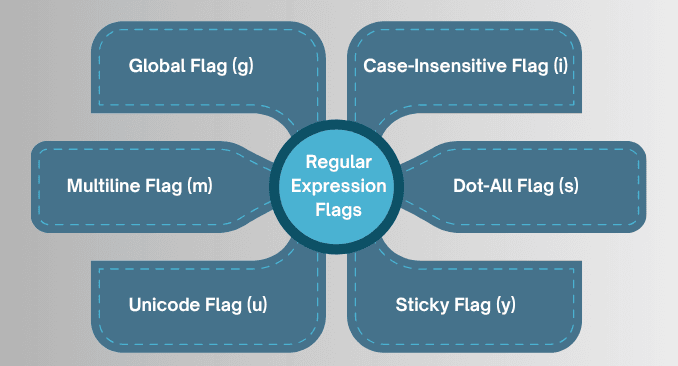Regular Expression Flags
Flags are optional modifiers that change the behavior of a regular expression. They are added after the closing / in literal syntax or as the second argument in the RegExp constructor.

1. Global Flag (g)
Searches for all matches in a string, not just the first one.
- Often used with
replace(),match(), and loops.
const str = "apple banana apple";
const regex = /apple/g;
console.log(str.match(regex)); // ["apple", "apple"]
console.log(str.replace(regex, "orange")); // "orange banana orange"
2. Case-Insensitive Flag (i)
Makes the match case-insensitive.
const str = "Hello World";
const regex = /hello/i;
console.log(regex.test(str)); // true
3. Multiline Flag (m)
Changes the behavior of ^ (start) and $ (end) to match the start/end of each line, not just the string.
const str = `Hello
World`;
const regex1 = /^World$/;
console.log(regex1.test(str)); // false
const regex2 = /^World$/m;
console.log(regex2.test(str)); // true
4. Dot-All Flag (s)
Makes the dot . match newline characters as well.
- Useful for matching multi-line content.
const str = "Hello\\nWorld";
const regex1 = /Hello.World/;
console.log(regex1.test(str)); // false
const regex2 = /Hello.World/s;
console.log(regex2.test(str)); // true
5. Unicode Flag (u)
Enables full Unicode support, including emojis and special characters.
- Required when working with Unicode code points >
0xFFFF.
const str = "💖";
const regex = /\\u{1F496}/u;
console.log(regex.test(str)); // true
6. Sticky Flag (y)
Matches from the exact position in the string (like lastIndex) rather than searching ahead.
- Often used in tokenizers and parsers.
const str = "hello hello";
const regex = /hello/y;
console.log(regex.exec(str)); // ["hello"]
regex.lastIndex = 6;
console.log(regex.exec(str)); // ["hello"]
Summary Table
| Flag | Description |
|---|---|
g | Global search (all matches) |
i | Case-insensitive search |
m | Multiline mode (^ and $ match each line) |
s | Dot matches newline (. matches \\n) |
u | Unicode mode |
y | Sticky search (match from lastIndex) |

